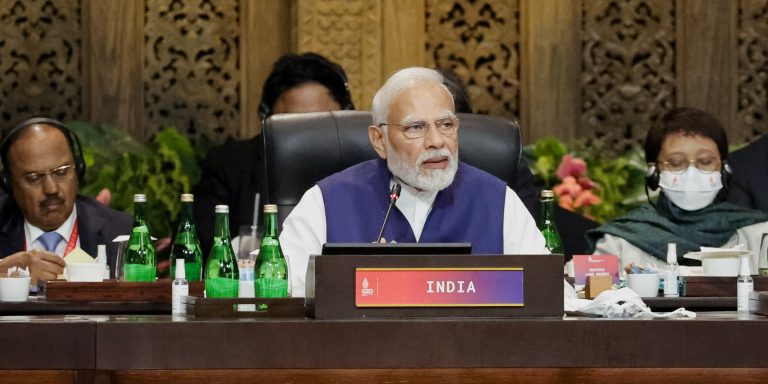INTELBRIEF
February 2, 2023
IntelBrief: India’s G20 Presidency Could Cool or Calcify China Disputes

Bottom Line Up Front
- The G20 presidency offers India a chance to address its bilateral issues with China through dialogue rather than confrontation.
- While Indian policy circles are excited about the county’s new role, the forum’s influence over international security matters is limited.
- S.-China competition places India in a position to influence the power balance of the Asia-Pacific region.
- Promoting policies that exclude or challenge China could inhibit intra-forum cooperation.
India’s assumption of the presidency of the Group of 20 (G20), an intergovernmental forum comprised of the world’s leading economies, has triggered euphoria within Indian policy circles and domestic media over the perceived power and prestige accompanying the position. Media commentators have suggested that India use this opportunity to transform the forum into an alternative to the UN Security Council that reflects contemporary economic and political influence. Others feel that India should use the G20 to counteract China strategically. However, G20 leadership can have limited value in affording status to its members. Founded in 1999 as an intergovernmental forum of finance ministers and central bankers, the group only began to include heads of state in 2009. Its narrow focus on economic matters makes the G20 less prominent in international security than platforms like the Group of 7 (G7), which recently displayed its teeth when it brought together member states to impose sanctions on Russia after Moscow’s illegal invasion of Ukraine.
Russia’s war in Ukraine challenges India’s presidency as the West brings its full arsenal of pressure tactics to isolate Russia into the G20. Problems stemming from the conflict have adversely impacted international trade and economic growth, mainly via fuel price shocks and massive unemployment in Ukraine. Though some have put faith in the middle path strategy of Indian Prime Minister Narendra Modi – under whom the country has neither signed on to Western sanctions nor UN resolutions condemning Russia’s war – the one-year term afforded to the G20 president will likely be insufficient to quell ongoing tensions amid a war in which both sides seem poised to battle for attrition.
Great power competition has cast a shadow over the G20 through the lens of the U.S.-China conflict, with members divided in their fealty to Washington or Beijing. Here, India and the United States may see eye-to-eye: U.S. Department of State has referred to India as “a vital partner in efforts to safeguard the Indo-Pacific” region, while New Delhi views China as India’s biggest security threat. Just nine days after India assumed the G20 Presidency in mid-December, hundreds of Indian and Chinese troops clashed in the northeastern Indian state of Arunachal Pradesh along a long-disputed, ill-defined border line known as Line of Actual Control, resulting in sustained injuries on both sides, though no deaths were reported. This latest skirmish was the worst since the summer of 2020, when a deadly clash in the Galwan Valley led to the death of at least 20 Indian and four Chinese soldiers, in what was perhaps the most significant border escalation since the 1962 Sino-Indian war.
The current standoff stems directly from the growing strategic competition between China and India. China views the strategic partnership between India and the West as a challenge to its influence in the Asia-Pacific region. The COVID-19 pandemic further exacerbated the standoff, as both countries put forth fewer diplomatic resources to resolve the dispute while dealing with pandemic-related crises. China is reportedly constructing infrastructure and increasing its military presence on territories in the eastern and western sectors of the border, which are claimed by India. Meanwhile, Indian construction of a road to an air base triggered the 2020 border conflict. Indian foreign policy is very likely to pivot around tackling the Chinese security threat and ensuring its own ascent in the Asian power balance.
The G20 offers India an opportunity to set the narrative and promote dialogue on issues where its core interests lie. New Delhi can leverage its G20 leadership to enhance regional security by using the forum to promote dialogue on security-related issues among G20 members and to build relationships with other countries in the region, including China, to the extent that it remains feasible. Promoting trade policies and economic growth that exclude other members or could be interpreted as challenging China's regional economic dominance will not augur well for broader intra-G20 cooperation. Moreover, if India uses its status in the forum to raise concerns about China's actions in the region as the United States likely prefers – bringing up territorial disputes in the South China Sea or its Belt and Road Initiative, for instance – it could be perceived as a direct threat to China’s regional influence and exacerbate existing tensions. Instead, India can use this opportunity to improve relations and build trust with China by finding common ground on global issues such as climate change. At the same time, the G20 presidency allows countries to set the forum’s agenda and shape its discussions on key issues like regional security and counterterrorism, which can help raise the country’s profile and priorities on the global stage.